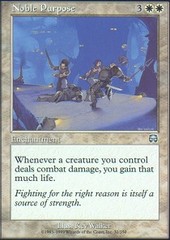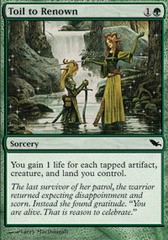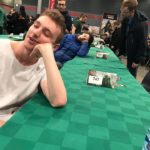The Mental Game of Magic the Gathering – Learning

“What a treacherous thing to believe that a person is more than a person.”
John Green, Paper Towns
I love this quote, it’s one of the only, if not the only quote that I can remember. How does it relate to magic? People always talk about skill level and how good they are. In fact it’s the same as any game or craft, people become idolised.
I live with Fabrizio Anteri, he’s become quite a good friend of mine. Before his banning and even now people look up to him as one of the greatest players in Magic. I did too before I lived with him but now I’ve come to realise he’s just like anyone else, aside from the somewhat demonic laugh he has. I’m not sure if he possesses the laugh or if it possesses him. Either way Fab is an amazing Magic player and he wasn’t born that way.
Long term gain: The best players are not superhuman.

The ‘ten thousand hour rule’ was created by Malcolm Gladwell, this states that on average to become a master of a craft you must obtain ten thousand hours of practice in that craft. Anders Ericsson also added that:
“many characteristics once believed to reflect innate talent are actually the result of intense practice extended for a minimum of 10 years”
To break down 10,000 hours across 10 years, you get 1,000 hours a year which is a little under 3 hours a day. This seems quite manageable when it comes to the mammoth task of trying to attain mastery in a given skill, here it’s Magic. This task becomes harder when you understand that it requires purposeful practice.
Long term gain: Purposeful practice.
Some people may not want to undergo a 10 year long quest to pursue greatness in one aspect of life. I can’t personally understand this but I’ve heard that the normal response to finding something you like is not to straight away devote your life to it.
What if you don’t currently spend 3 hours a day playing Magic? Make your purposeful practice relevant to the amount of hours you play and the amount of focus you have. If you play 2 hours a day on your days off then you could spend the whole 2 hours with maximum focus. If you play for 2 hours in the evenings after a hard day of work, consider spending just 15 minutes on hardcore practice.
Long term gain: Make your practice hours relevant to your life.

How do we actually give some meaning to our practice? There are many ways to do this, I’ll explore one today but you can do anything that works for you.
Hypothetically if you had read my last article and actually used the table of variance idea that I wrote about you would have a bank of data about your recent games. You can use this as a basis for purposeful practice. Take the column of ‘Learning Points’ and start thinking about them, use the power of your brain. This is something I do after a tournament or even the day after. Try and recreate the spot you had in the game in your head.
Long term gain: Try and take at least one thing from each match you play to review later.
This is not a groundbreaking new theory, thinking about tough decisions after the fact. However there are a few nuances that I would like to point out. The reason to even write down the spots you find yourself in is to maximise your energy on the day. When you’re playing a big tournament you don’t want to spend any time thinking about anything other than what’s the play right now and how do I win this game.
Have you ever thought to yourself:
‘If i’d attacked with X creature then I would be in a much better position.’
‘I just can’t win after my opponent killed X creature.’
‘Wish I had just blocked last turn.’
These are all things that you had control over but they should be eliminated from your mind. Try and tuck them away so that you can remember the spots for learning. You can even jot down a note of what happened at the time, this could help you put the moment behind you. To play optimally you need to play in the now, stay focused and stay in the moment.
Long term gain: Play in the now.
If you’re not lucky enough to live with other Magic players then talk to literally anyone that will listen, parent, grandchild, toucan. Being able to turn your thoughts into something tangible that people can understand shows a great understanding of what you’re actually thinking about. If you can’t do this then consider going back and cementing your understanding of the subject first.
Long term gain: Get a toucan, okay just kidding.

Eliminate toxic thoughts about variance from your learning, this is a big one. Whether you’re thinking about it or talking to people, don’t even begin to waste your energy on what could have been. The land you didn’t draw does not matter to your life, I promise. You need to get to the point where you don’t even consider these things, I can’t stress how much this will help your learning and how much you will improve at Magic. This is something everyone can get better at.
Bad beat stories.
Okay, just don’t do it. There’s a fine line between understanding variance, which is incredibly useful, and just blaming variance. The thought ‘my opponent got so lucky’ doesn’t benefit you in any way. Try and think ahead a year from now, will you remember how lucky any of your opponents were against you? No. Will you appreciate that you took the time to instead focus on what you could have done better and improved as a player? Absolutely you will be reaping the rewards.
Every time I hear a bad beat story, the underlying theme is that is wasn’t the players’ fault. This can be true in many cases, there may be no way you could have won that game. That doesn’t change the action you need to take. Don’t just discard a game because you got unlucky, analyse it, think about the things that you can control.
Adopt this way of thinking, share it with your friends. Otherwise when you’re trying to have a constructive discussion about Magic it just won’t work. It’s like fighting reason with nonsense. This would be a great way of getting better together at learning. It feels amazing to have productive discussions about Magic and getting rid of toxic variance related stories is just the start.
It’s almost like an escape button that you can press after a match. ‘Oh I didn’t draw any lands’ is just an excuse for not wanting to think about the match, there’s always some meaningful decision that you could be thinking about. Next time you have that thought, just take a step back and really think about the game. Maybe you there’s something huge like you should have mulliganed. Perhaps you just find something small like discarding a different card to cleanup when you were stuck on lands. These things might seem insignificant in the match you just played but they all add up to make you a better player in the future.
Long term gain: No more ‘bad beat’ stories
Today I only covered one way to improve your learning but I think it’s such an important thing to get right. I hope I’ve conveyed the importance of practising purposefully to become the very person that you once idolised. Anyone can be the best, do something today that you will be thankful for tomorrow.
Let me know in the comments if you have any questions, or if there is a specific subject you would like me to tackle in the future.





